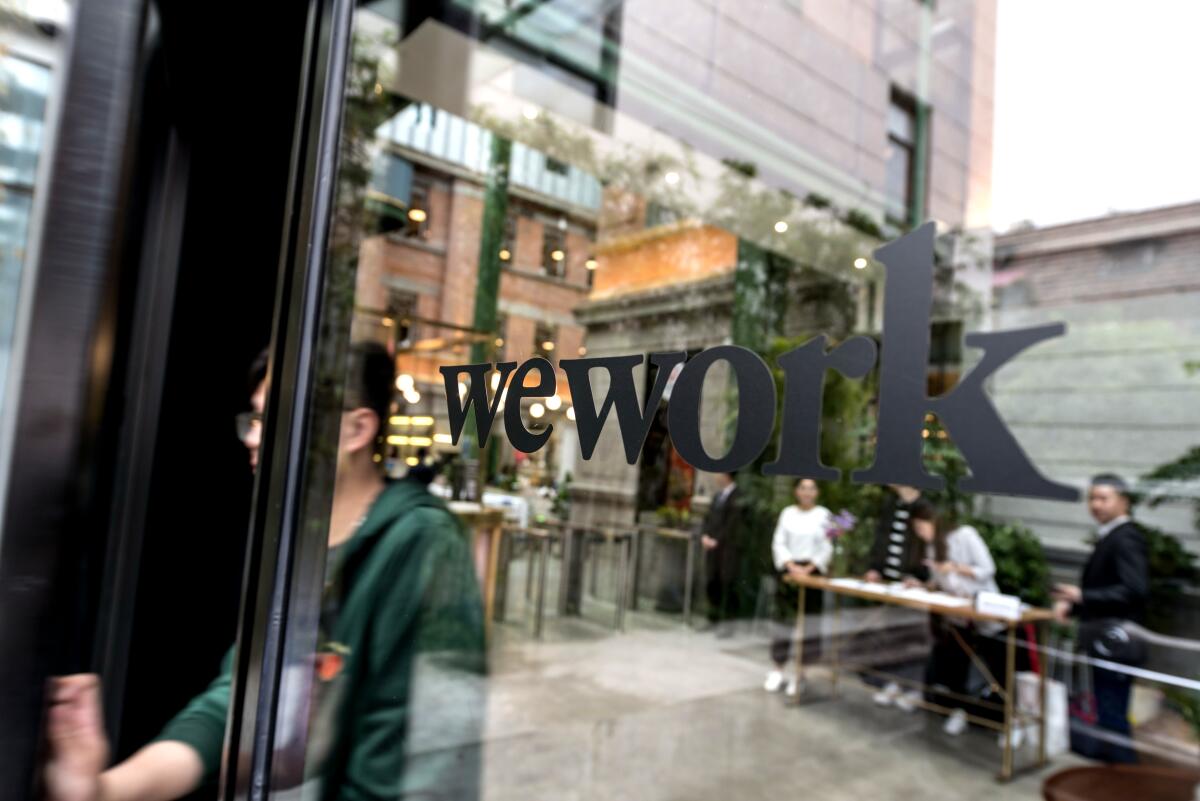WeWork’s start-up party ends, with some 2,000 jobs set to be cut

- Share via
Start-up workers often worry that going public means the fun is about to end — quarterly financial reports, disciplined spending, cheaper coffee. At WeWork, not going public may have brought a worse fate.
Just three days after withdrawing its registration for an initial public offering, WeWork informed staff of far-reaching job cuts to come by the end of the month, said people who attended the meeting. Three top executives delivered the news from a room at WeWork’s New York headquarters Thursday afternoon. Although the executives didn’t specify how many jobs were on the line, people familiar with the discussions have pegged the amount at about 2,000, representing some 16% of the global workforce. Deliberations are ongoing, and the number could change.
Signs that the party is ending came in both subtle and more direct ways. Many staff meetings at WeWork, even somber ones, have included alcohol. This one did not. An employee asked in the meeting whether the WeWork Global Summit, a celebrity-adorned event in Los Angeles that employees look forward to every year, would still take place in January. Executives said it would not.
Other big-budget parties are probably also on the chopping block as expenses get reined in and corporate culture downshifts. WeWork has taken pride in the past in providing employees with outlandish corporate events, like lavish Halloween parties headlined by Wyclef Jean and summer camps in the English countryside featuring Lorde.
The cost-cutting at WeWork’s parent company, We Co., resembles what’s happening now at Uber Technologies Inc. The ride-hailing company said it was cutting more than 800 employees this summer. It also eliminated celebratory balloons for staff anniversaries. Each company counts SoftBank Group Corp. as its largest shareholder, and each is deeply unprofitable. The difference is that Uber actually made it to the stock market.
WeWork employees are accustomed to routine firings, unlike at the typical start-up in growth mode. The 9-year-old company periodically trimmed the ranks, WeWork has said, to get rid of low performers. It dismissed hundreds of employees in 2016 and held a staff meeting to discuss the move that concluded with a performance from a member of the hip-hop group Run-DMC. WeWork fired about 300 more this spring. Each time, WeWork said it would accelerate hiring after the cull. No such pronouncements were made this week.
This round looks to be the start of a new era for the company. WeWork is still private, but it’s not a start-up anymore. Its spiritual leaders, Adam and Rebekah Neumann, left last week under pressure from investors. The third founder, Miguel McKelvey, stood Thursday alongside the new co-chief executive officers, Artie Minson and Sebastian Gunningham, where the topic of discussion was not the scourge of eating meat or elevating the world’s consciousness. It was about divestitures, efforts to “right-size” the business and more measured growth.
The executives said they expect WeWork will continue to grow but at a slower pace, according to people who attended the meeting. The co-CEOs, after sending a message to customers Wednesday seeking to ease concerns about the business, told employees that clients and tenants were still interested in WeWork services. The executives urged staff to focus on the co-working business and its customers.
In the presentation, made available to all 12,500 or so WeWork employees, Minson apologized for the recent weeks of uncertainty. Executives didn’t offer a solution for workers whose shares may be underwater based on recent valuation estimates from WeWork’s financial advisors. They spoke broadly about selling off parts of the business but didn’t give specifics. Privately, executives have explored a sale of several recent acquisitions, including Conductor, Managed by Q and Meetup, as well as a private jet and a large stake in Wing, the female-focused co-working start-up.
WeWork and its ilk are finding that investors in public stocks aren’t buying what works best in the private markets: high-growth, high-expense, high-minded brands. Lyft Inc., Peloton Interactive Inc. and Uber are all trading below their IPO prices. And making a show of cost-cutting may not be the formula to sell a new stock to public investors, who are looking for a growth story. Since news of the first round of summer job cuts, Uber’s stock has fallen 32%.
For now, WeWork just needs to convince private investors, SoftBank in particular. The Japanese conglomerate has dumped more than $10 billion into WeWork and isn’t eager to see its investment evaporate. It’s turning to an emissary, Marcelo Claure, to help fix the company. That will probably buy WeWork some time to form a strategy to sell the public on the new WeWork and hope it forgets about the old one, before making another run at an IPO next year.
In the meantime, WeWork isn’t totally done having fun. There is an opening party for WeWork Japan in Kobe scheduled for next week and it’s planning a launch event for a new European headquarters, billed as the largest co-working space in the world, people with knowledge of the plans said this week. About 500 employees are invited, and there will be food and drinks in the building, which has a skate ramp, retro arcade games and bed-shaped couches with blankets. However, people with knowledge of the event said that, compared with previous WeWork launch parties, it’ll be a toned-down affair.
Jack Sidders contributed to this report.
More to Read
Inside the business of entertainment
The Wide Shot brings you news, analysis and insights on everything from streaming wars to production — and what it all means for the future.
You may occasionally receive promotional content from the Los Angeles Times.










